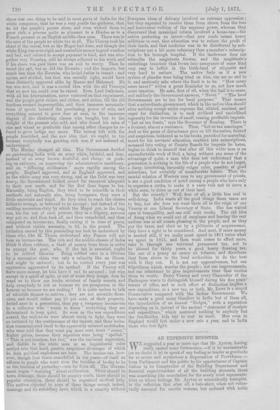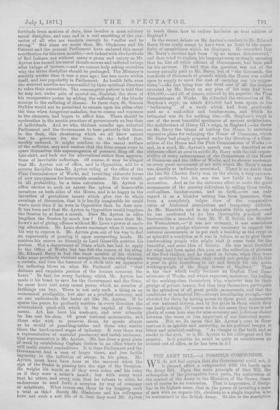AN EXPENSIVE MINISTER.
WE suggested a year or more ago that Mr. Ayrton, having really earned some forbearance,—if it be unreasonable (as no doubt it is) to speak of any feeling so tender as gratitude for so severe and mysterious a dispensation of Providence,— from Parliament and the public by his appointment of Captain Galton to be Comptroller of the Building Department and financial superintendent of all the building accounts, there was something like consolation for the sorely tried representa- tives on whose feelings Mr. Ayrton so scientifically tramples, in the reflection that after all, a hair-shirt, when not volun- tarily assumed for ascetic reasons, but endured with noble fortitude from motives of duty, does involve a most salutary moral discipline, and may end in a real ennobling of the cha- racter of all who are resolute enough to "suffer and be strong." But since we wrote thus, Mr. Gladstone and his Cabinet and the present Parliament have endured this moral scarification for thirteen months,—not indeed with the fortitude of Red Indians, not without many a groan and outcry as Mr. Ayrton has turned his moral thunala-screws and inflicted twinge after twinge of torture,—and wo cannot help asking ourselves why the bitter discipline should be prolonged. The Ministry is sensibly weaker than it was a year ago ; has less nerve within itself, and less popularity in Parliament. As health fails, even the strictest ascetics are commanded by their spiritual directors to relax their austerities. The consumptive patient is told that he may not, under pain of mortal sin, diminish the store of his recuperative power by adding the suffering of the bloody scourge to the suffering of disease. In these days, St, Simeon Stylites would. not be permitted to remain upon his pillar after the time when dangerous maladies, due to cramp and exposure to the elements, had begun to afflict him. There should be moderation in the ascetic practices of governments no less than of individuals. And we who, thirteen months ago, exhorted Parliament and the Government to bear patiently this thorn in the flesh, this chastening which we all know cannot but be grievous for the time, in the belief that, meekly endured, it might conduce to the moral welfare of the sufferers, may now confess that the time seems come to spare themselves this supererogation of penance, fling off the hair-shirt, and look out for alleviations rather than aggiava- tions of inevitable sufferings. Of course, it may be alleged that Mr. Ayrton out of office, and in Opposition, will be a severer discipline thansMr. Ayrton ruling at the office of the First Commissioner of Works, and inventing elaborate forms of new annoyances for honourable members. But this would, in all probability, be a false calculation, Mr. Ayrton in office excites to such an extent the spleen of honourable members on both sides of the House, and is so happy in the invention of gratuitous taunts which give rise to whole evenings of discussion, that it is hardly imaginable he could waste more time if he wore in Opposition than he does now. It has been said that Mr. Ayrton in Opposition would lengthen the Session by at least a month. Does Mr. Ayrton in office lengthen the Session by much loss ? He has more than Mr. Lowe's art of giving offence without Mr. Lowe's power of excit- ing admiration. Mr. Lowe allows contempt when it comes in his way to express it. Mr. Ayrton goes out of his way to find an opportunity of pouring it upon unexpecting heads. He scatters his sneers as liberally as Lord Granville scatters his praises. Not a department of State which has had to apply to the Office of Works but has felt the venom of his sting. Mr. Edward Barry is but the most notable of his victims. Like some peculiarly virulent mosquitoes, he can sting through a curtain, and turn the hammer of a clock into an apparatus for inflicting blows on what Mr. Peclesniff called that delicate and exquisite portion of the human eeonomy, the heart." In fact., for every farthing which Mr. Ayrton has made it his boast to save for the Government and the State, he must have cast away moral power which no number of farthings can buy. There is not only such a thing as an economical prodigality, but also as a prodigal economy. and no one understands the latter art, like Mr. Ayrton. If he spares the pence, he profusely scatters in every direction the accumulated good-will which is the capital of Govern- ments. Art.. has been his wash-pot, and over urbanity he has cast his shoe. Of great national monuments, and those who wish to preserve them, he speaks almost as he would of gambling-tables and those who scatter there the hard-earned wages of industry. If ever there was a representative of wasteful parsimony and lavish acrimony, that representative is Mr. Ayrton. He has done a good piece of work by establishing Captain Galton in an office where he will really control expenditure. It is time Parliament and the Government had a man of larger views, and loss fertile ingenuity in the infliction of stings, in his place. Mr. Ayrton must have been born at the moment when the sign of the Scales is passing into the sign of the Scorpion. Ho weighs his words as if they were coins, and his coins as if they were a miser's hoard ; but with every word that he utters, and every coin that he refuses to utter, ho endeavours to send forth a scorpion by way of company or substitute. What reason can there be for hugging such
a trial as this Surely Mr. Gladstone and his colleagues have not such a soft life of it, that they need Mr. Ayrton to teach them how to endure hardness as true soldiers of England In the recent debate on Mr. Ayrton's conduct to Mr. Edward Barry there really seems to have been no limit to the super- fluity of naughtiness which he displayed. He remarked that Mr. Barry's services had been " by no moans disinterested," and then tried to explain his language away as simply meaning that he, like all other officers of Government, had been paid. for his services. He said that the question was not of the money actually paid. to Mr. Barry, but of " the thousands, the hundreds of thousands of pounds which the House was called upon to supply to meet the cost of carrying out his sugges- tions,"—the fact being that the total cost of all the designs executed by Mr. Barry on any plan of his own had been £6G,000,—and all, of course, ordered by his superior, the First Commissioner of Works. He ridiculed the restoration of St. Stephen's crypt, on which £30,000 had been spent, as the "bedizening" of a vault which had been previously used as a coal-cellar and lumber-room, and which he intimated was fit for nothing else,—St. Stephen's crypt is one of the most beautiful specimens of ancient architecture,
the architecture of Henry reign, in England ;—he threw on Mr. Barry the blame of leading the House to entertain expensive plans for enlarging the House of Commons, which Mr. Barry had simply prepared, under the direction of a Com- mittee of the House and the First Commissioner of Works ;- and, in a word, Mr. Ayrton's speech may be described as an elaborate effort at once to saddle Mr. Barry with the full respon- sibility of every extravagance of the Committees of the House of Commons and the Office of Works, and to shower contempt on every great monument of art with which Mr. Barry's name was directly or indirectly associated. There is no doubt that the late Sir Charles Barry \57 as, on the whole, a very extrava- gant architect, but his son was not liable to any like accusation. And as for the elaborate effort to make the great monuments of the country ridiculous by calling thorn vaults, coal-cellars, lumber-rooms, and so forth,—we can only regard it as a blunder arising less from ignorance, than from a completely vulgar view of the comparative value of historical associations and temporary utilities. As Mr. Mandella said in his admirable little speech,—and he was confirmed by no less thoroughly practical and business-like a member than Mr. W. H. Smith, the Member for Westminster,—" it was not economy, it was scandalous parsimony, to grudge whatever was necessary to support the national monuments, or to put such a building as the crypt in as splendid a condition as it was in before, so as to give those hardworking people who might visit it some taste for the beautiful, and some idea of history. He was most thankful for what had been spent this year on the collection of pictures of the Peel Gallery, and he hoped in future, when they were wasting money by millions, they would not grudge ,i110,000 a year to give something to art and beauty for our noble working-people of the dingy towns of England." That is the view which really becomes an English First Com- missioner of Works, and which expresses, moreover, the feeling of the working-class themselves, who, whatever may be their grudge of private luxury, feel that they themselves participate in the splendour of all great public monuments, and that the conditions of industrial life—always humiliating enough,—are elevated for them by having access to those great monuments of our national history, and by the pride in them which they can justly indulge. Of course we do not mean that there is not plenty of room here also for wise economy and judicious choice between the more or less important of our historical monu- ments. But we do mean that Mr. Ayrton's tone in these matters is as ignoble and unworthy, as his political temper is bitter and mischief-making. "As vinegar to the teeth and as smoke to the eyes," so is Mr. Ayrton to his colleagues and the country. Is it possible he could be quite so mischievous an irritant out of office, as he has been in it ?



































 Previous page
Previous page